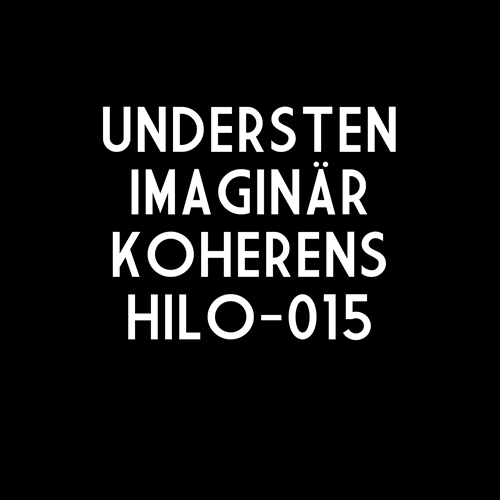When Cotton Ferox began as an active project in the glorious year of 2000, Thomas Tibert and me had made the decision that we would work together with a diverse bouquet of talents when it came to the vocal contributions. As the first album grew, this also became the case. For First Time Hurts (originally released on CD in 2002), we collaborated with Krister Linder, Michael Moynihan and Genesis Breyer P-Orridge. A powerful mix, to say the least! The sessions with Genesis turned into seductive lyrics and performances on the tracks Snake Hiss and Amenema. These were, however, basically recordings that were left over from material for our album number 2, Wordship, then already in progress. Not left over in a qualitative sense of course, but definitely in a quantitative one. Wordship is an album that was made entirely together with Genesis in Stockholm in 2002 (originally released on CD in 2004). There was also a DJ set at Kulturhuset and a sold out lecture at experimental haven/venue...
Understen is coming to get you!
Understen’s Imaginär Koherens album from 2010 swept by underneath the radar of everyone, including Understen themselves. That’s why it’s a necessary privilege to be able to re-release this little gem of improv lo-fi psychedelia via the Highbrow Lowlife imperium-emporium. Way back when, in 1987 to be exact, two frustrated Stockholm youngsters got together to make some music. I was one of them. Jan Ekman was the other one. We called the band White Stains. That initial phase got me actively interested in making music and that is something that hasn’t really changed, ever. To make noise or rock’n’roll or both together with Jan was a lot of fun and I guess the peak of our first phase of collaboration was when we played at the Hultsfred festival in 1989, with Thomas Tibert at the mixing desk. This concert can be heard in its entirety on the The Somewhat Lost Horizon album, which will, incidentally, also be re-released this autumn. Carl A & Jan E...
Contemporary occultism in glossy color
Nice and colorful publications dealing with esoteric topics are nowadays almost a dime a dozen, and that is of course a very good thing. The general interest in occultism and esoteric doctrines is proof of intelligence and constructive behavior in stagnant cultures. In particular, the intersection between art and the esoteric has nowadays become an integrated field of study in many academic environments. One publication that caught my attention recently is The AMeTh Lodge Journal, Vol I, No 2, published by Ordo Templi Orientis in London. This is the second issue of the Journal, and it strikes me as symptomatic of the intellectual climate we’re currently in. A Thelemic fraternity, OTO, publishes something that successfully reaches outside of their own esoteric environment and into a culture starved of substantial spirituality. No wonder, I should say, because this book/magazine behaves more like an art catalogue and is lavish and well produced on all levels. Where the occult...
PTV & White Stains: “At Stockholm” revisited
Genesis P-Orridge at around the time of recording AT STOCKHOLM. At Stockholm was the first full length album by White Stains. After a turbulent first year of existence, circa 1987-1988, the band had evolved from loud psychedelic rock to considerably more experimental vibes. A great instigator of this change was Thomas Tibert, who became an integrated member late 1988. This intersectional dynamic is clearly audible when listening to material from the era. Compare, for instance, the two final “93” singles (The Awareness and The Result) – essentially pop music in contemporary clothes – with the first ever White Stains performance at the Hultsfred festival of 1989: violent and experimental ad-libbing. Other interesting things happened at the time too. I made plans with Genesis P-Orridge to set up a Scandinavian spoken word tour for a mini-version of Psychick TV, ie Genesis and then wife Paula. There were some poetry festivals occuring here at around the same time, so we...




